【单元考点培优】Module 2 Public holidays 专题07 句型转换-2025-2026学年九年级英语上册单元复习考点培优外研版(含答案解析)
文档属性
| 名称 | 【单元考点培优】Module 2 Public holidays 专题07 句型转换-2025-2026学年九年级英语上册单元复习考点培优外研版(含答案解析) | 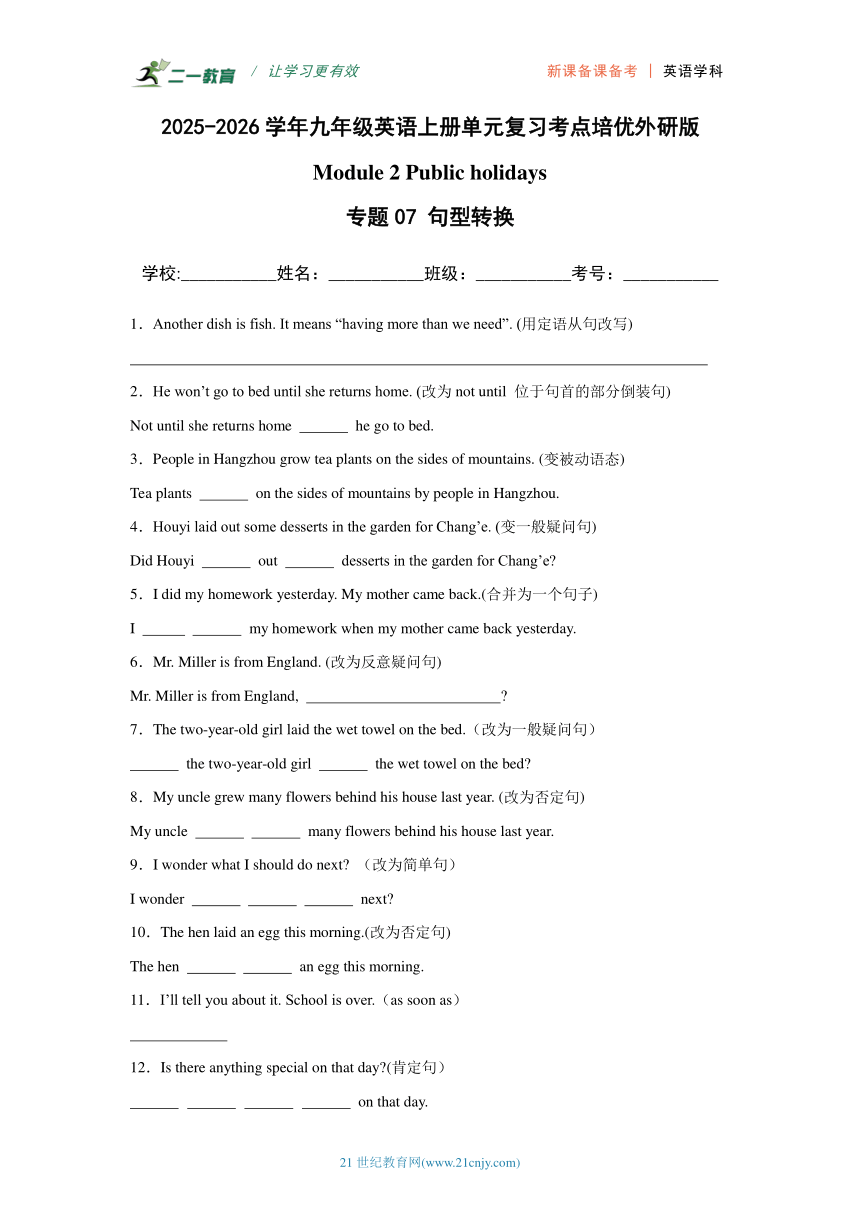 | |
| 格式 | docx | ||
| 文件大小 | 54.4KB | ||
| 资源类型 | 试卷 | ||
| 版本资源 | 外研版 | ||
| 科目 | 英语 | ||
| 更新时间 | 2025-07-31 15:16:44 | ||
图片预览

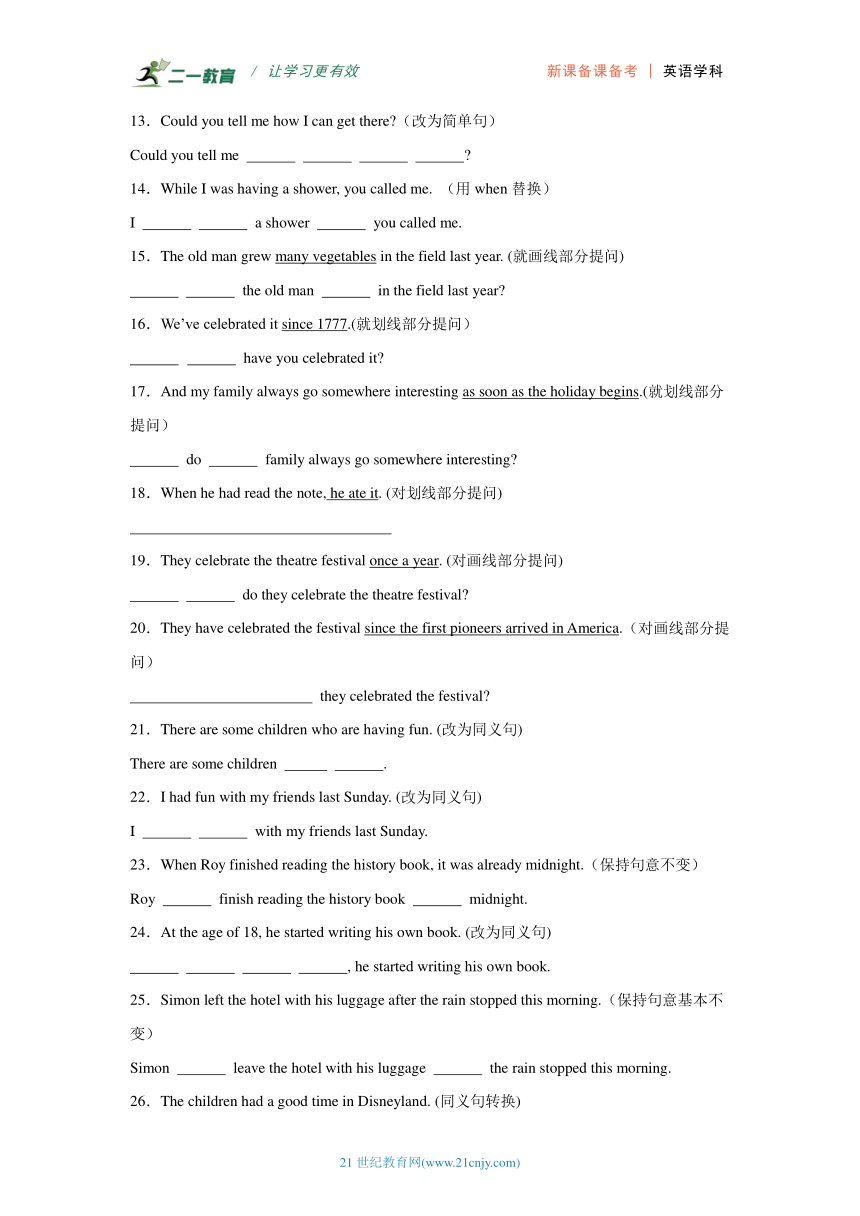
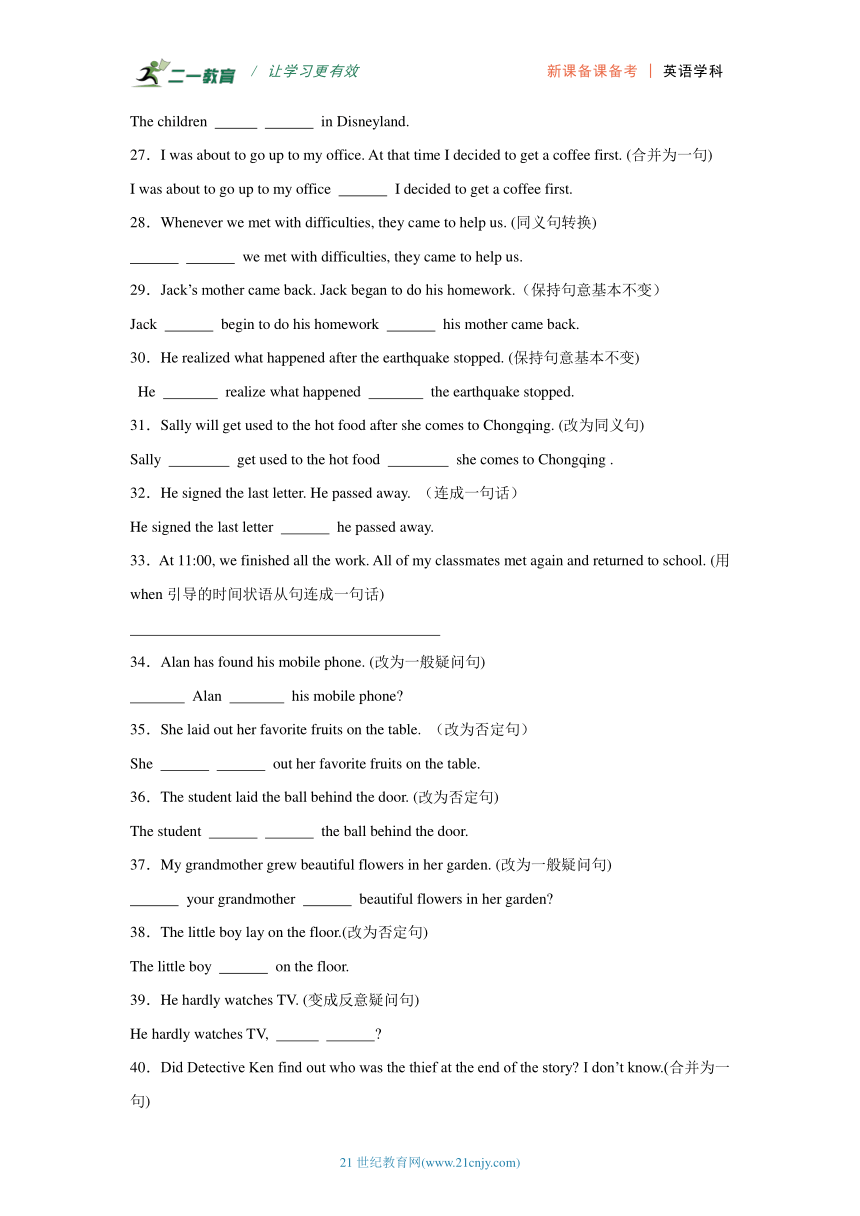
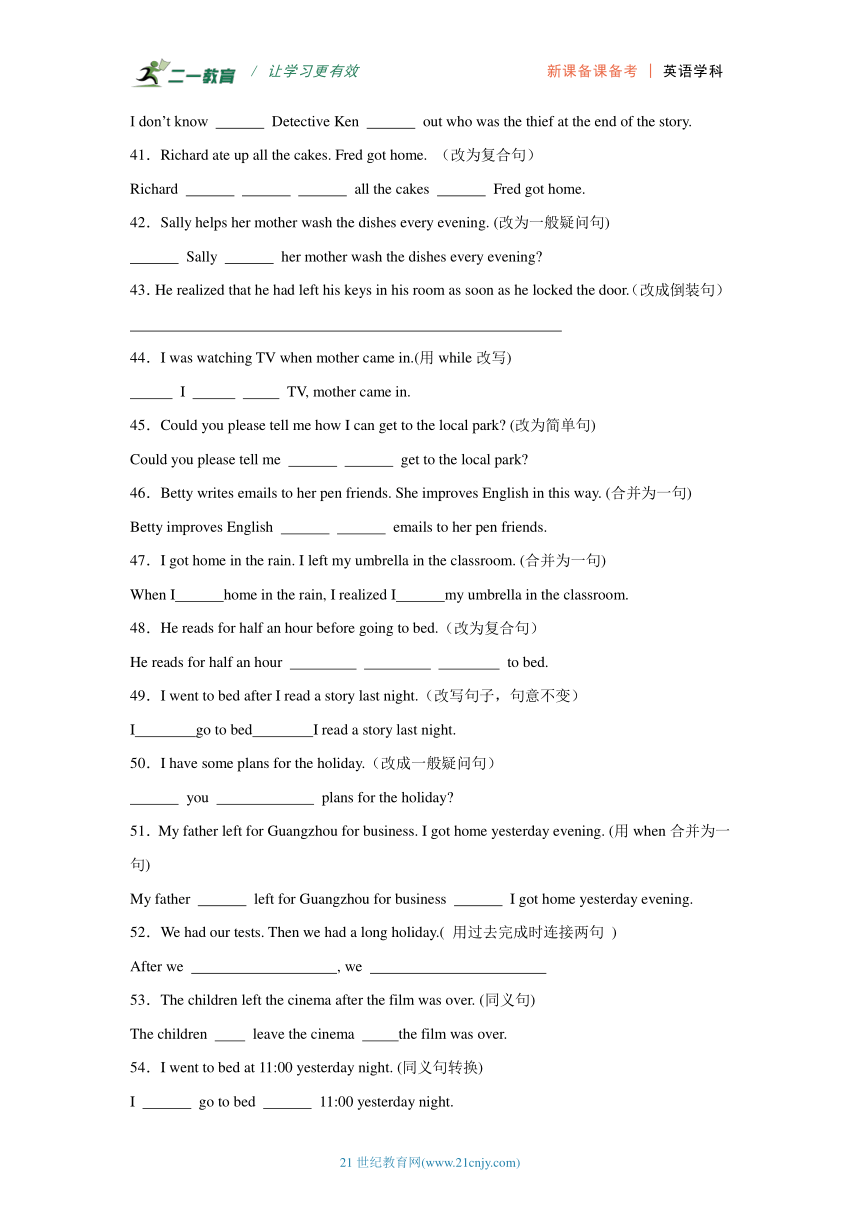
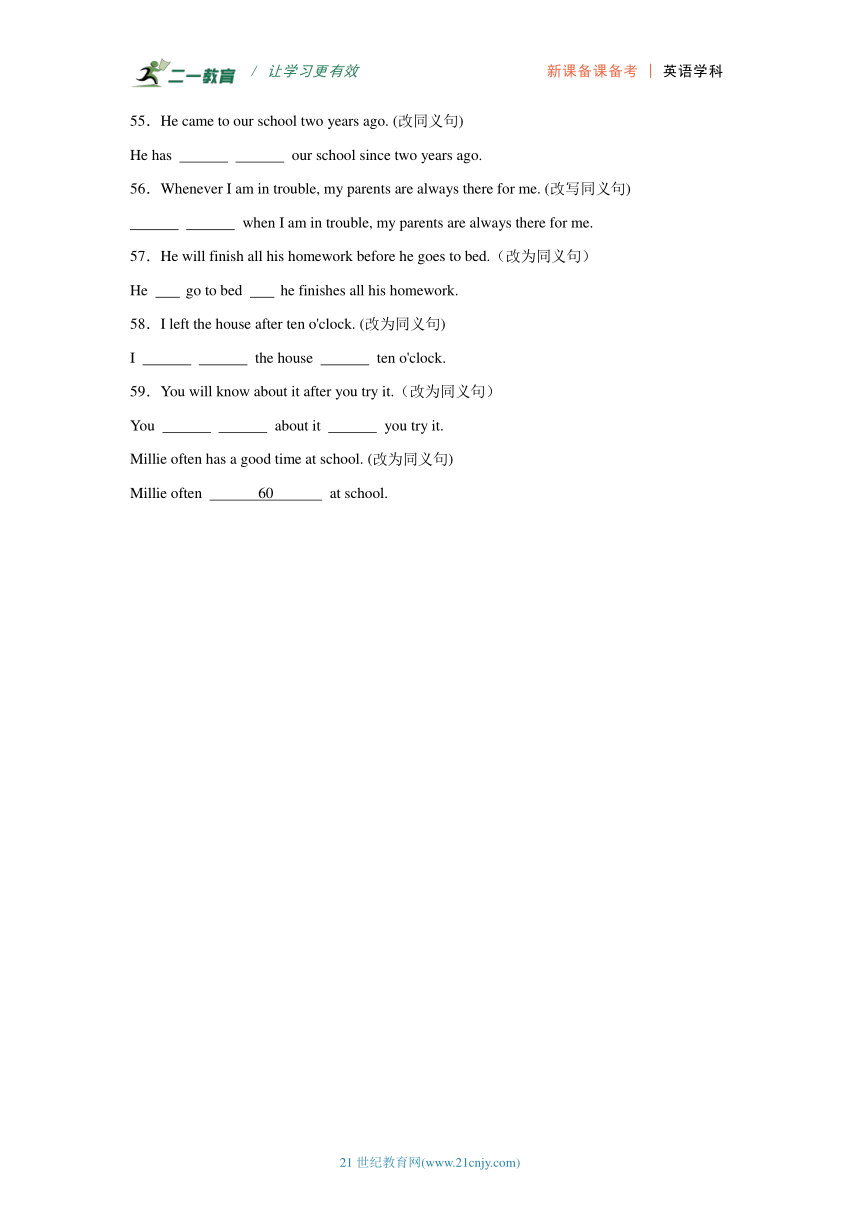
文档简介
/ 让学习更有效 新课备课备考 | 英语学科
/ 让学习更有效 新课备课备考 | 英语学科
2025-2026学年九年级英语上册单元复习考点培优外研版
Module 2 Public holidays
专题07 句型转换
学校:___________姓名:___________班级:___________考号:___________
1.Another dish is fish. It means “having more than we need”. (用定语从句改写)
2.He won’t go to bed until she returns home. (改为not until 位于句首的部分倒装句)
Not until she returns home he go to bed.
3.People in Hangzhou grow tea plants on the sides of mountains. (变被动语态)
Tea plants on the sides of mountains by people in Hangzhou.
4.Houyi laid out some desserts in the garden for Chang’e. (变一般疑问句)
Did Houyi out desserts in the garden for Chang’e
5.I did my homework yesterday. My mother came back.(合并为一个句子)
I my homework when my mother came back yesterday.
6.Mr. Miller is from England. (改为反意疑问句)
Mr. Miller is from England,
7.The two-year-old girl laid the wet towel on the bed.(改为一般疑问句)
the two-year-old girl the wet towel on the bed
8.My uncle grew many flowers behind his house last year. (改为否定句)
My uncle many flowers behind his house last year.
9.I wonder what I should do next (改为简单句)
I wonder next
10.The hen laid an egg this morning.(改为否定句)
The hen an egg this morning.
11.I’ll tell you about it. School is over.(as soon as)
12.Is there anything special on that day (肯定句)
on that day.
13.Could you tell me how I can get there (改为简单句)
Could you tell me
14.While I was having a shower, you called me. (用when替换)
I a shower you called me.
15.The old man grew many vegetables in the field last year. (就画线部分提问)
the old man in the field last year
16.We’ve celebrated it since 1777.(就划线部分提问)
have you celebrated it
17.And my family always go somewhere interesting as soon as the holiday begins.(就划线部分提问)
do family always go somewhere interesting
18.When he had read the note, he ate it. (对划线部分提问)
19.They celebrate the theatre festival once a year. (对画线部分提问)
do they celebrate the theatre festival
20.They have celebrated the festival since the first pioneers arrived in America.(对画线部分提问)
they celebrated the festival
21.There are some children who are having fun. (改为同义句)
There are some children .
22.I had fun with my friends last Sunday. (改为同义句)
I with my friends last Sunday.
23.When Roy finished reading the history book, it was already midnight.(保持句意不变)
Roy finish reading the history book midnight.
24.At the age of 18, he started writing his own book. (改为同义句)
, he started writing his own book.
25.Simon left the hotel with his luggage after the rain stopped this morning.(保持句意基本不变)
Simon leave the hotel with his luggage the rain stopped this morning.
26.The children had a good time in Disneyland. (同义句转换)
The children in Disneyland.
27.I was about to go up to my office. At that time I decided to get a coffee first. (合并为一句)
I was about to go up to my office I decided to get a coffee first.
28.Whenever we met with difficulties, they came to help us. (同义句转换)
we met with difficulties, they came to help us.
29.Jack’s mother came back. Jack began to do his homework.(保持句意基本不变)
Jack begin to do his homework his mother came back.
30.He realized what happened after the earthquake stopped. (保持句意基本不变)
He realize what happened the earthquake stopped.
31.Sally will get used to the hot food after she comes to Chongqing. (改为同义句)
Sally get used to the hot food she comes to Chongqing .
32.He signed the last letter. He passed away. (连成一句话)
He signed the last letter he passed away.
33.At 11:00, we finished all the work. All of my classmates met again and returned to school. (用when引导的时间状语从句连成一句话)
34.Alan has found his mobile phone. (改为一般疑问句)
Alan his mobile phone
35.She laid out her favorite fruits on the table. (改为否定句)
She out her favorite fruits on the table.
36.The student laid the ball behind the door. (改为否定句)
The student the ball behind the door.
37.My grandmother grew beautiful flowers in her garden. (改为一般疑问句)
your grandmother beautiful flowers in her garden
38.The little boy lay on the floor.(改为否定句)
The little boy on the floor.
39.He hardly watches TV. (变成反意疑问句)
He hardly watches TV,
40.Did Detective Ken find out who was the thief at the end of the story I don’t know.(合并为一句)
I don’t know Detective Ken out who was the thief at the end of the story.
41.Richard ate up all the cakes. Fred got home. (改为复合句)
Richard all the cakes Fred got home.
42.Sally helps her mother wash the dishes every evening. (改为一般疑问句)
Sally her mother wash the dishes every evening
43.He realized that he had left his keys in his room as soon as he locked the door.(改成倒装句)
44.I was watching TV when mother came in.(用while改写)
I TV, mother came in.
45.Could you please tell me how I can get to the local park (改为简单句)
Could you please tell me get to the local park
46.Betty writes emails to her pen friends. She improves English in this way. (合并为一句)
Betty improves English emails to her pen friends.
47.I got home in the rain. I left my umbrella in the classroom. (合并为一句)
When I home in the rain, I realized I my umbrella in the classroom.
48.He reads for half an hour before going to bed.(改为复合句)
He reads for half an hour to bed.
49.I went to bed after I read a story last night.(改写句子,句意不变)
I go to bed I read a story last night.
50.I have some plans for the holiday.(改成一般疑问句)
you plans for the holiday
51.My father left for Guangzhou for business. I got home yesterday evening. (用when合并为一句)
My father left for Guangzhou for business I got home yesterday evening.
52.We had our tests. Then we had a long holiday.( 用过去完成时连接两句 )
After we , we
53.The children left the cinema after the film was over. (同义句)
The children leave the cinema the film was over.
54.I went to bed at 11:00 yesterday night. (同义句转换)
I go to bed 11:00 yesterday night.
55.He came to our school two years ago. (改同义句)
He has our school since two years ago.
56.Whenever I am in trouble, my parents are always there for me. (改写同义句)
when I am in trouble, my parents are always there for me.
57.He will finish all his homework before he goes to bed.(改为同义句)
He go to bed he finishes all his homework.
58.I left the house after ten o'clock. (改为同义句)
I the house ten o'clock.
59.You will know about it after you try it.(改为同义句)
You about it you try it.
Millie often has a good time at school. (改为同义句)
Millie often 60 at school.
/ 让学习更有效 新课备课备考 | 英语学科
/ 让学习更有效 新课备课备考 | 英语学科
21世纪教育网(www.21cnjy.com)
21世纪教育网(www.21cnjy.com)
参考答案及试题解析
1.Another dish is fish, which means “having more than we need”.
【解析】句意:另一道菜是鱼。这意味着“拥有比我们需要的更多”。考查定语从句。定语从句的先行词是fish,修饰物,用关系代词which替换。故填Another dish is fish, which means “having more than we need”.
2.will
【解析】句意:他直到她回家才会去睡觉。当not until位于句首时,句子需进行部分倒装,结构为“Not until+从句+助动词/情态动词/be动词+主语+谓语剩余部分”;won’t是will not的缩写,体现将来时态;把Not until she returns home置于句首后,需将助动词will提前,构成部分倒装。故填will。
3.are grown
【解析】句意:杭州人在山边种植茶树。将主动语态变为被动语态时,需将宾语“tea plants”变为主语;时态为一般现在时,动词“grow”变为被动形式“are grown”。故填are grown。
4.lay any
【解析】句意:后羿在花园里为嫦娥摆了些点心。根据空前的“Did”可知,主语后用动词原形lay“放置”;some“一些”,一般用于肯定句,改为一般疑问句时,some应改为any“任何”。故填lay;any。
5.was doing
【解析】句意:我昨天做了作业。我妈妈回来了。题目要求合并为一个句子,即“昨天妈妈回来时,我正在做作业”,根据句中从句谓语“came back”提示,主句应用过去时态,且表示过去某个时刻正在发生的动作应用过去进行时,且主语为“I”,故应用“was doing”结构,故填was;doing。
6.isn’t he
【解析】句意:米勒先生来自英国。反意疑问句遵循“前肯后否,前否后肯”的原则,原句是含有be动词的一般现在时,反意部分否定直接在is后加not即可,用he代指“Mr. Miller”。故填isn’t he。
7.Did lay
【解析】句意:这个两岁的女孩把湿毛巾放在床上。原句由“laid”推断为实义动词型的一般过去时态,其变一般疑问句要用助动词Did,并将过去式laid恢复原形成lay。故填Did;lay。
8.didn’t grow
【解析】句意:去年我叔叔在他的房屋后面种了许多花。根据所给句子可知,时态为一般过去时,且谓语动词为实义动词“grew”,变否定句时用助动词didn’t+动词原形。故填didn’t;grow。
9.what to do
【解析】句意:我想知道我下一步应该做什么。疑问词+to do,作宾语,what I should do next=what to do next表示“下一步做什么”,故填what;to;do。
10.didn’t lay
【解析】句意:母鸡今天早上下了一个蛋。原句时态是一般过去时,变否定句要借助助动词didn't,后跟动词原形。故填didn’t;lay。
11.I’ll tell you about it as soon as school is over.
【解析】句意:我会告诉你的。学校结束。原句可改为“一放学我就告诉你”,as soon as意为“一……就”,引导时间状语从句。“school is over”作为从句,故填I’ll tell you about it as soon as school is over.
12.There is something special
【解析】句意:那一天有某件特殊的事情吗?肯定句变成“there be”的结构。“anything”是单数概念,用“There is”。“anything”表达“某事”用于疑问句,肯定句中用“something”。复合不定代词的定语后置,形容词“special”放在“something”后修饰。故填There;is;something;special。
13.how to get there
【解析】句意:你能告诉我怎么去那吗?原句中“how I can get there”作“tell”的宾语,构成宾语从句,可以和“how+动词不定式”作宾语进行转换,get there“到那”,故填how;to;get;there。
14.was having when
【解析】句意:我在洗澡时,你给我打电话了。when引导时间状语从句用一般过去时时,若主句动作为延续性动词,那么主句时态用过去进行时。故填was;having;when。
15.What did grow
【解析】句意:这位老人去年在地里种了许多蔬菜。划线部分是物,应该用what提问,由“last year”可知,此句为一般过去时,特殊疑问词后要用助动词did,后面的动词用动词原形。故填What;did;grow。
16.How long
【解析】句意:自从1777年我们就庆祝它。划线部分表达“自从1777年”表达动作延续的时间,疑问句表达“多长时间”用“how long”提问。句首首字母“h”提示。故填How;long。
17.When your
【解析】句意:假期一开始,我的家人就总是去有趣的地方。根据划线部分可知,用特殊疑问词“when”,位于句首,首字母大写;再者根据“特殊疑问句规则”可知,第一人称需要改为第二人称,因此“my”改为“your”。故填When;your。
18.What did he do when he had read the note
【解析】句意:他看完便条就把它吃了。划线部分是he ate it可知,此处是用what来提问,根据语境是一般过去时态,含有实意动词,变成特殊疑问句要借助助动词did,What did he do when he had read the note “他看了便条后做了什么?”故填What did he do when he had read the note
19.How often
【解析】句意:他们每年庆祝一次戏剧节。要求对画线部分提问。分析原句,意思是他们每年庆祝一次戏剧节。画线部分是once a year一年一次,表示频率的,所以用特殊疑问词How often,后接一般疑问句,句意为“他们多久庆祝一次戏剧节?”故填 How;often。
20.How long have
【解析】句意:自从第一批拓荒者来到美国后,他们就庆祝这个节日。根据划线部分“since the first pioneers arrived in America”可知,英语中提问一段时间用how long,原句用的是现在完成时,所以变成疑问句时,要把助动词have放于主语they之前,故填How long have。
21.having fun
【解析】句意:有些孩子正在玩得很开心。根据“There are”可知,该句能改为there be sb doing,为现在分词作定语,修饰其前的名词,相当于一个定语从句。故填having;fun。
22.enjoyed myself
【解析】句意:上周日我和朋友们玩得很开心。have fun=enjoy oneself“玩得开心”;根据过去式“had”可知,此句也用一般过去时,动词用过去式enjoyed;主语为“I”,反身代词应用myself“我自己”。故填enjoyed;myself。
23.didn’t until
【解析】句意:当 Roy读完历史书,时间已经是午夜。根据“finished” 可知句子时态是一般过去时,变成同义句,用not...until“直到……才”改写,借助助动词did not进行否定。故填didn’t;until。
24.When he was eighteen/18
【解析】句意:18岁时,他开始写自己的书。at the age of+年龄/when sb. was+年龄“在某人多少岁时”,此处用when引导的时间状语从句。故填When;he;was;eighteen/18。
25.didn’t until
【解析】句意:西蒙今天早上雨停后带着行李离开了酒店。根据题干,同义句应表示“直到雨停了,西蒙才离开酒店”,短语not...until表示“直到……才……”,句子是一般过去时,需借助助动词didn’t表示否定。故填didn’t;until。
26.enjoyed/had themselves/fun
【解析】句意:孩子们在迪斯尼乐园玩得很开心。have a good time=enjoy oneself=have fun。“玩得开心”;根据“had”可知,时态为一般过去时,故动词要用过去式;再由“The children”可知,反身代词要用themselves,表示“他们自己”。故填enjoyed/had;;themselves/fun。
27.when
【解析】句意:我将要上楼去我的办公室。在那时我决定先去买一杯咖啡。根据原句意思可知当说话者决定先买咖啡的时候正打算去办公室,when“当……时”符合语境,故填when。
28.Every time
【解析】句意:每当我们遇到困难时,他们就来帮助我们。whenever表示“每当”,引导时间状语从句,此时可替换为every time“每当”,首字母大写。故填Every;time。
29.didn’t until
【解析】句意:杰克的母亲回来了。杰克开始做作业。可以改为until引导的状语从句,not…until“直到……才”,即“杰克直到他妈妈回来才开始做作业”,本句为一般过去时,第一个空使用didn’t。故填didn’t;until。
30.didn’t until
【解析】句意:地震停止后他意识到发生了什么。此句也可用not…until…“直到……才……”表达。原句为一般过去时,应该用助动词did,与not合并为didn’t。故填didn’t;until。
31.won’t until
【解析】句意:萨利来到重庆之后会习惯吃辣的食物。原句是after引导的时间状语从句,表示“在……之后”之意,此处可以同义转换为“not...until”句型,意为“直到……才”。主句时态为一般将来时,will not缩写为won’t。故填won’t;until。
32.before
【解析】句意:他在最后一封信上签了名。他去世了。两句连成一句,可表示为“ 去世前他在最后一封信上签了名”。before,连词,表示“在……之前”,引导时间状语从句。故填before。
33.At 11:00, when we finished all the work, all of my classmates met again and returned to school.
【解析】句意:11 点,我们完成了所有作业。我的所有同学再次相聚,回到了学校。本题考查“when”引导的时间状语从句将两个简单句合并成一个复合句。第一句包含时间点,作为时间状语从句,由“when”引导,表示动作发生的时间背景;第二句作为主句,描述在该时间发生的动作。因此,合并后结构为:When + 从句,主句。故填At 11:00, when we finished all the work, all of my classmates met again and returned to school.
34.Has found
【解析】句意:Alan找到他的手机了。根据原句可知,本句时态为现在完成时。现在完成时一般疑问句的结构为: Have/Has+主语+动词的过去分词+其它。本句主语是第三人称单数Alan,所以助动词用Has,动词的过去分词为found(发现)。故填Has;found。
35.didn’t lay
【解析】句意:她把她最喜欢的水果摆在桌子上了。根据“laid out”可知,句子是一般过去时,变否定句时借助助动词didn’t,后加动词原形lay。故填didn’t;lay。
36.didn’t lay
【解析】句意:学生把球放在了门后。原句为一般过去时,且谓语动词laid为实义动词,改为否定句时,需借助助动词did,其否定形式为didn’t,后接动词原形,laid的原形为lay。故填didn’t;lay。
37.Did grow
【解析】句意:我奶奶在她的花园里种了漂亮的花。原句时态为一般过去时,动词“grew”为实义动词,故改为一般疑问句,要用助动词did,后接动词原形grow。故填Did;grow。
38.didn’t lie
【解析】句意:小男孩躺在地板上。“lay on the floor”表示“躺在地板上”,lay是lie的过去式“躺”,否定句借助于助动词didn’t,后接动词原形lie,故填didn’t lie。
39.does he
【解析】句意:他几乎不看电视。此句是一般现在时,句中含有实义动词watches,因此借助助动词does提问;由hardly可知陈述句部分是否定意义,故反意疑问句需用肯定形式。故填does;he。
40.if/whether found
【解析】句意:在故事的结尾肯侦探发现谁是小偷了吗?我不知道。根据题干可知,宾语从句的从句部分原句是一般疑问句,所以从句的引导词要用if或whether;结合主句时态为一般现在时,所以从句的时态不受限制,原句的时态是一般过去时,所以动词用found形式,故填if/whether;found 。
41.had eaten up before
【解析】句意:理查德吃光了所有的蛋糕。弗雷德回家。改为复合句应是“理查德在弗雷德回家之前把蛋糕都吃光了”,before“在……之前”,放于第4空,引导时间状语从句;主句“吃光蛋糕”的动作发生在从句“回家”的动作之前,从句用的是一般过去时,则主句应用过去完成时(had done),eat up的过去分词是eaten up。故填had;eaten;up;before。
42.Does help
【解析】句意:莎莉每天晚上帮她妈妈洗碗。考查一般疑问句。主语是Sally,第三人称单数形式,由实意动词helps可知时态为一般现在时,所以变一般疑问句要在句首加助动词does,实意动词helps变为原形help,故填Does;help。
43.Hardly had he locked the door when he realized that he had left his keys in his room.
【解析】句意:他刚锁上门才意识到他把钥匙忘在他的房间。原句realized后面是一个that引导的宾语从句,从句中有一个as soon as“一……就……”引导的时间状语从句,改为倒装句时要用到hardly...when...引导的时间状语从句,并遵循主句谓语动词采用过去完成时had locked,when引导的从句不倒装。故填Hardly had he locked the door when he realized that he had left his keys in his room.
44.While was watching
【解析】while引导的时间状语从句用进行时,根据I was watching TV可知此处用过去进行时,故为While;was; watching。
45.how to
【解析】句意:你能告诉我去当地公园怎么走吗?要求改为简单句。原句是宾语从句,可以改为用疑问词+不定式的简单形式;疑问词用how“怎么”,不定式是to后跟动词原形get;故答案填how;to。
46.by writing
【解析】句意:贝蒂给她的笔友写电子邮件,她用这种方法提高英语水平。要求合并为一句,即“贝蒂通过给她的笔友写电子邮件来提高英语水平”,所以用介词by,表示“通过”,后接动名词writing,故填by;writing。
47.got had left
【解析】句意:我冒雨到家了。我把雨伞落在教室里了。分析句子结构及原句时态可知,“when”引导时间状语从句,且描述过去某时发生的动作,所以第一空用一般过去时。再根据“realized”可知,当宾语从句的主句为一般过去时,从句要用过去的某种时态。“落下(雨伞)”的动作发生在“意识到”之前,所以第二空要用过去完成时来表达,其结构是:had done。故填got;had left。
48.before he goes
【解析】句意:他睡觉前读半小时书。原句going to bed是现在分词结构做状语,可改为before引导的时间状语从句;he是单数第三人称,动词go需用三单形式。故填before;he;goes。
49.didn't until
【解析】句意:昨晚我读了一篇故事后就上床睡觉了。after引导的时间状语从句,可以和not...until...互相转换,表示前后关系。根据went可知是一般过去时态,需借助助动词did,did not缩写成didn't。故填didn't;until。
50.Do have any
【解析】句意:我有一些假期计划。根据原句动词“have”可知,原句用的是一般现在时,变成疑问句要用助动词do/ does,主语是I,变为一般疑问句用you,助动词应选用do,some用于肯定句,一般疑问句要用any,故填Do,have any。
51.had when
【解析】句意:我父亲去广州出差了。我昨天晚上到家了。根据所给两句句意可知,父亲离开在我到家之前,所以合并之后应该变成“当我到家时,父亲已经离开去广州了”,主句表示过去的过去,所以应该用过去完成时,故填had,when。
52.had had our tests had a long holiday
【解析】我们考试了。然后我们放了一个长假。根据语境可知此处指“我们考完试后放了一个长假”;即“放假之前考试”,表示过去某动作以前已经发生动作用过去完成时;故填had had our tests;had a long holiday。
53.didn’t until
【解析】句意:电影结束后,孩子们离开了电影院。改为同义句,用“not ... until ...”替换,表示“直到……才……”,时态为一般过去时,助动词用过去式didn’t。故填didn’t;until。
54.didn’t until
【解析】句意:我昨天晚上11点上床睡觉。要求同义句转化,“直到11点才上床睡觉”,not ... until ...“直到……才……”,由yesterday可知,此句为一般过去时,助动词用did,did和not可缩写为didn’t。故填didn’t;until。
55.been in
【解析】He came to our school two years ago.(改同义句)根据come来,短暂性动词,不能和时间段连用,用be in来代替,根据since two years ago用现在完成时,故填(1). been (2). in。
56.No matter
【解析】句意:无论我什么时候深陷困难,我的父母都在我身边。whenever与no matter when同义,表示“无论什么时候”,此处引导状语从句。故填No matter。
57.won’t until/till
【解析】句意:他将在睡觉前完成所有的家庭作业。改为同义句,可用“not...until/till...”结构,意为“直到……才……”;此处引导时间状语从句,主句要用一般将来时,从句要用一般现在时,因此第一空填won’t,第二空填until/till。故填won’t;until/till。
58.didn’t leave until
【解析】句意:我在十点后离开了房子。根据原句“改为同义句”的要求,改后的句意可以是“我直到10点钟才离开房子”,故可使用短语not…until“直到…才”,结合本句时态,故填didn’t, leave, until。
59.won’t know until
【解析】句意:你试过之后就会知道了。根据句意和空处数量和位置可知应用“not...until”句型,意为“直到……才……”,同时主句用一般将来时,从句用一般现在时,因此第一空应填否定词won’t,第二空填动词原形know,最后一空填until,故填won’t;know;until。
has fun
【解析】句意:Millie经常在学校玩的开心。短语have a good time意为“玩的开心”,同义短语是have fun,主语是Millie,是第三人称单数主语,所以谓语动词要用三单形式has,故填 has fun。
21世纪教育网(www.21cnjy.com)
21世纪教育网(www.21cnjy.com)
/ 让学习更有效 新课备课备考 | 英语学科
2025-2026学年九年级英语上册单元复习考点培优外研版
Module 2 Public holidays
专题07 句型转换
学校:___________姓名:___________班级:___________考号:___________
1.Another dish is fish. It means “having more than we need”. (用定语从句改写)
2.He won’t go to bed until she returns home. (改为not until 位于句首的部分倒装句)
Not until she returns home he go to bed.
3.People in Hangzhou grow tea plants on the sides of mountains. (变被动语态)
Tea plants on the sides of mountains by people in Hangzhou.
4.Houyi laid out some desserts in the garden for Chang’e. (变一般疑问句)
Did Houyi out desserts in the garden for Chang’e
5.I did my homework yesterday. My mother came back.(合并为一个句子)
I my homework when my mother came back yesterday.
6.Mr. Miller is from England. (改为反意疑问句)
Mr. Miller is from England,
7.The two-year-old girl laid the wet towel on the bed.(改为一般疑问句)
the two-year-old girl the wet towel on the bed
8.My uncle grew many flowers behind his house last year. (改为否定句)
My uncle many flowers behind his house last year.
9.I wonder what I should do next (改为简单句)
I wonder next
10.The hen laid an egg this morning.(改为否定句)
The hen an egg this morning.
11.I’ll tell you about it. School is over.(as soon as)
12.Is there anything special on that day (肯定句)
on that day.
13.Could you tell me how I can get there (改为简单句)
Could you tell me
14.While I was having a shower, you called me. (用when替换)
I a shower you called me.
15.The old man grew many vegetables in the field last year. (就画线部分提问)
the old man in the field last year
16.We’ve celebrated it since 1777.(就划线部分提问)
have you celebrated it
17.And my family always go somewhere interesting as soon as the holiday begins.(就划线部分提问)
do family always go somewhere interesting
18.When he had read the note, he ate it. (对划线部分提问)
19.They celebrate the theatre festival once a year. (对画线部分提问)
do they celebrate the theatre festival
20.They have celebrated the festival since the first pioneers arrived in America.(对画线部分提问)
they celebrated the festival
21.There are some children who are having fun. (改为同义句)
There are some children .
22.I had fun with my friends last Sunday. (改为同义句)
I with my friends last Sunday.
23.When Roy finished reading the history book, it was already midnight.(保持句意不变)
Roy finish reading the history book midnight.
24.At the age of 18, he started writing his own book. (改为同义句)
, he started writing his own book.
25.Simon left the hotel with his luggage after the rain stopped this morning.(保持句意基本不变)
Simon leave the hotel with his luggage the rain stopped this morning.
26.The children had a good time in Disneyland. (同义句转换)
The children in Disneyland.
27.I was about to go up to my office. At that time I decided to get a coffee first. (合并为一句)
I was about to go up to my office I decided to get a coffee first.
28.Whenever we met with difficulties, they came to help us. (同义句转换)
we met with difficulties, they came to help us.
29.Jack’s mother came back. Jack began to do his homework.(保持句意基本不变)
Jack begin to do his homework his mother came back.
30.He realized what happened after the earthquake stopped. (保持句意基本不变)
He realize what happened the earthquake stopped.
31.Sally will get used to the hot food after she comes to Chongqing. (改为同义句)
Sally get used to the hot food she comes to Chongqing .
32.He signed the last letter. He passed away. (连成一句话)
He signed the last letter he passed away.
33.At 11:00, we finished all the work. All of my classmates met again and returned to school. (用when引导的时间状语从句连成一句话)
34.Alan has found his mobile phone. (改为一般疑问句)
Alan his mobile phone
35.She laid out her favorite fruits on the table. (改为否定句)
She out her favorite fruits on the table.
36.The student laid the ball behind the door. (改为否定句)
The student the ball behind the door.
37.My grandmother grew beautiful flowers in her garden. (改为一般疑问句)
your grandmother beautiful flowers in her garden
38.The little boy lay on the floor.(改为否定句)
The little boy on the floor.
39.He hardly watches TV. (变成反意疑问句)
He hardly watches TV,
40.Did Detective Ken find out who was the thief at the end of the story I don’t know.(合并为一句)
I don’t know Detective Ken out who was the thief at the end of the story.
41.Richard ate up all the cakes. Fred got home. (改为复合句)
Richard all the cakes Fred got home.
42.Sally helps her mother wash the dishes every evening. (改为一般疑问句)
Sally her mother wash the dishes every evening
43.He realized that he had left his keys in his room as soon as he locked the door.(改成倒装句)
44.I was watching TV when mother came in.(用while改写)
I TV, mother came in.
45.Could you please tell me how I can get to the local park (改为简单句)
Could you please tell me get to the local park
46.Betty writes emails to her pen friends. She improves English in this way. (合并为一句)
Betty improves English emails to her pen friends.
47.I got home in the rain. I left my umbrella in the classroom. (合并为一句)
When I home in the rain, I realized I my umbrella in the classroom.
48.He reads for half an hour before going to bed.(改为复合句)
He reads for half an hour to bed.
49.I went to bed after I read a story last night.(改写句子,句意不变)
I go to bed I read a story last night.
50.I have some plans for the holiday.(改成一般疑问句)
you plans for the holiday
51.My father left for Guangzhou for business. I got home yesterday evening. (用when合并为一句)
My father left for Guangzhou for business I got home yesterday evening.
52.We had our tests. Then we had a long holiday.( 用过去完成时连接两句 )
After we , we
53.The children left the cinema after the film was over. (同义句)
The children leave the cinema the film was over.
54.I went to bed at 11:00 yesterday night. (同义句转换)
I go to bed 11:00 yesterday night.
55.He came to our school two years ago. (改同义句)
He has our school since two years ago.
56.Whenever I am in trouble, my parents are always there for me. (改写同义句)
when I am in trouble, my parents are always there for me.
57.He will finish all his homework before he goes to bed.(改为同义句)
He go to bed he finishes all his homework.
58.I left the house after ten o'clock. (改为同义句)
I the house ten o'clock.
59.You will know about it after you try it.(改为同义句)
You about it you try it.
Millie often has a good time at school. (改为同义句)
Millie often 60 at school.
/ 让学习更有效 新课备课备考 | 英语学科
/ 让学习更有效 新课备课备考 | 英语学科
21世纪教育网(www.21cnjy.com)
21世纪教育网(www.21cnjy.com)
参考答案及试题解析
1.Another dish is fish, which means “having more than we need”.
【解析】句意:另一道菜是鱼。这意味着“拥有比我们需要的更多”。考查定语从句。定语从句的先行词是fish,修饰物,用关系代词which替换。故填Another dish is fish, which means “having more than we need”.
2.will
【解析】句意:他直到她回家才会去睡觉。当not until位于句首时,句子需进行部分倒装,结构为“Not until+从句+助动词/情态动词/be动词+主语+谓语剩余部分”;won’t是will not的缩写,体现将来时态;把Not until she returns home置于句首后,需将助动词will提前,构成部分倒装。故填will。
3.are grown
【解析】句意:杭州人在山边种植茶树。将主动语态变为被动语态时,需将宾语“tea plants”变为主语;时态为一般现在时,动词“grow”变为被动形式“are grown”。故填are grown。
4.lay any
【解析】句意:后羿在花园里为嫦娥摆了些点心。根据空前的“Did”可知,主语后用动词原形lay“放置”;some“一些”,一般用于肯定句,改为一般疑问句时,some应改为any“任何”。故填lay;any。
5.was doing
【解析】句意:我昨天做了作业。我妈妈回来了。题目要求合并为一个句子,即“昨天妈妈回来时,我正在做作业”,根据句中从句谓语“came back”提示,主句应用过去时态,且表示过去某个时刻正在发生的动作应用过去进行时,且主语为“I”,故应用“was doing”结构,故填was;doing。
6.isn’t he
【解析】句意:米勒先生来自英国。反意疑问句遵循“前肯后否,前否后肯”的原则,原句是含有be动词的一般现在时,反意部分否定直接在is后加not即可,用he代指“Mr. Miller”。故填isn’t he。
7.Did lay
【解析】句意:这个两岁的女孩把湿毛巾放在床上。原句由“laid”推断为实义动词型的一般过去时态,其变一般疑问句要用助动词Did,并将过去式laid恢复原形成lay。故填Did;lay。
8.didn’t grow
【解析】句意:去年我叔叔在他的房屋后面种了许多花。根据所给句子可知,时态为一般过去时,且谓语动词为实义动词“grew”,变否定句时用助动词didn’t+动词原形。故填didn’t;grow。
9.what to do
【解析】句意:我想知道我下一步应该做什么。疑问词+to do,作宾语,what I should do next=what to do next表示“下一步做什么”,故填what;to;do。
10.didn’t lay
【解析】句意:母鸡今天早上下了一个蛋。原句时态是一般过去时,变否定句要借助助动词didn't,后跟动词原形。故填didn’t;lay。
11.I’ll tell you about it as soon as school is over.
【解析】句意:我会告诉你的。学校结束。原句可改为“一放学我就告诉你”,as soon as意为“一……就”,引导时间状语从句。“school is over”作为从句,故填I’ll tell you about it as soon as school is over.
12.There is something special
【解析】句意:那一天有某件特殊的事情吗?肯定句变成“there be”的结构。“anything”是单数概念,用“There is”。“anything”表达“某事”用于疑问句,肯定句中用“something”。复合不定代词的定语后置,形容词“special”放在“something”后修饰。故填There;is;something;special。
13.how to get there
【解析】句意:你能告诉我怎么去那吗?原句中“how I can get there”作“tell”的宾语,构成宾语从句,可以和“how+动词不定式”作宾语进行转换,get there“到那”,故填how;to;get;there。
14.was having when
【解析】句意:我在洗澡时,你给我打电话了。when引导时间状语从句用一般过去时时,若主句动作为延续性动词,那么主句时态用过去进行时。故填was;having;when。
15.What did grow
【解析】句意:这位老人去年在地里种了许多蔬菜。划线部分是物,应该用what提问,由“last year”可知,此句为一般过去时,特殊疑问词后要用助动词did,后面的动词用动词原形。故填What;did;grow。
16.How long
【解析】句意:自从1777年我们就庆祝它。划线部分表达“自从1777年”表达动作延续的时间,疑问句表达“多长时间”用“how long”提问。句首首字母“h”提示。故填How;long。
17.When your
【解析】句意:假期一开始,我的家人就总是去有趣的地方。根据划线部分可知,用特殊疑问词“when”,位于句首,首字母大写;再者根据“特殊疑问句规则”可知,第一人称需要改为第二人称,因此“my”改为“your”。故填When;your。
18.What did he do when he had read the note
【解析】句意:他看完便条就把它吃了。划线部分是he ate it可知,此处是用what来提问,根据语境是一般过去时态,含有实意动词,变成特殊疑问句要借助助动词did,What did he do when he had read the note “他看了便条后做了什么?”故填What did he do when he had read the note
19.How often
【解析】句意:他们每年庆祝一次戏剧节。要求对画线部分提问。分析原句,意思是他们每年庆祝一次戏剧节。画线部分是once a year一年一次,表示频率的,所以用特殊疑问词How often,后接一般疑问句,句意为“他们多久庆祝一次戏剧节?”故填 How;often。
20.How long have
【解析】句意:自从第一批拓荒者来到美国后,他们就庆祝这个节日。根据划线部分“since the first pioneers arrived in America”可知,英语中提问一段时间用how long,原句用的是现在完成时,所以变成疑问句时,要把助动词have放于主语they之前,故填How long have。
21.having fun
【解析】句意:有些孩子正在玩得很开心。根据“There are”可知,该句能改为there be sb doing,为现在分词作定语,修饰其前的名词,相当于一个定语从句。故填having;fun。
22.enjoyed myself
【解析】句意:上周日我和朋友们玩得很开心。have fun=enjoy oneself“玩得开心”;根据过去式“had”可知,此句也用一般过去时,动词用过去式enjoyed;主语为“I”,反身代词应用myself“我自己”。故填enjoyed;myself。
23.didn’t until
【解析】句意:当 Roy读完历史书,时间已经是午夜。根据“finished” 可知句子时态是一般过去时,变成同义句,用not...until“直到……才”改写,借助助动词did not进行否定。故填didn’t;until。
24.When he was eighteen/18
【解析】句意:18岁时,他开始写自己的书。at the age of+年龄/when sb. was+年龄“在某人多少岁时”,此处用when引导的时间状语从句。故填When;he;was;eighteen/18。
25.didn’t until
【解析】句意:西蒙今天早上雨停后带着行李离开了酒店。根据题干,同义句应表示“直到雨停了,西蒙才离开酒店”,短语not...until表示“直到……才……”,句子是一般过去时,需借助助动词didn’t表示否定。故填didn’t;until。
26.enjoyed/had themselves/fun
【解析】句意:孩子们在迪斯尼乐园玩得很开心。have a good time=enjoy oneself=have fun。“玩得开心”;根据“had”可知,时态为一般过去时,故动词要用过去式;再由“The children”可知,反身代词要用themselves,表示“他们自己”。故填enjoyed/had;;themselves/fun。
27.when
【解析】句意:我将要上楼去我的办公室。在那时我决定先去买一杯咖啡。根据原句意思可知当说话者决定先买咖啡的时候正打算去办公室,when“当……时”符合语境,故填when。
28.Every time
【解析】句意:每当我们遇到困难时,他们就来帮助我们。whenever表示“每当”,引导时间状语从句,此时可替换为every time“每当”,首字母大写。故填Every;time。
29.didn’t until
【解析】句意:杰克的母亲回来了。杰克开始做作业。可以改为until引导的状语从句,not…until“直到……才”,即“杰克直到他妈妈回来才开始做作业”,本句为一般过去时,第一个空使用didn’t。故填didn’t;until。
30.didn’t until
【解析】句意:地震停止后他意识到发生了什么。此句也可用not…until…“直到……才……”表达。原句为一般过去时,应该用助动词did,与not合并为didn’t。故填didn’t;until。
31.won’t until
【解析】句意:萨利来到重庆之后会习惯吃辣的食物。原句是after引导的时间状语从句,表示“在……之后”之意,此处可以同义转换为“not...until”句型,意为“直到……才”。主句时态为一般将来时,will not缩写为won’t。故填won’t;until。
32.before
【解析】句意:他在最后一封信上签了名。他去世了。两句连成一句,可表示为“ 去世前他在最后一封信上签了名”。before,连词,表示“在……之前”,引导时间状语从句。故填before。
33.At 11:00, when we finished all the work, all of my classmates met again and returned to school.
【解析】句意:11 点,我们完成了所有作业。我的所有同学再次相聚,回到了学校。本题考查“when”引导的时间状语从句将两个简单句合并成一个复合句。第一句包含时间点,作为时间状语从句,由“when”引导,表示动作发生的时间背景;第二句作为主句,描述在该时间发生的动作。因此,合并后结构为:When + 从句,主句。故填At 11:00, when we finished all the work, all of my classmates met again and returned to school.
34.Has found
【解析】句意:Alan找到他的手机了。根据原句可知,本句时态为现在完成时。现在完成时一般疑问句的结构为: Have/Has+主语+动词的过去分词+其它。本句主语是第三人称单数Alan,所以助动词用Has,动词的过去分词为found(发现)。故填Has;found。
35.didn’t lay
【解析】句意:她把她最喜欢的水果摆在桌子上了。根据“laid out”可知,句子是一般过去时,变否定句时借助助动词didn’t,后加动词原形lay。故填didn’t;lay。
36.didn’t lay
【解析】句意:学生把球放在了门后。原句为一般过去时,且谓语动词laid为实义动词,改为否定句时,需借助助动词did,其否定形式为didn’t,后接动词原形,laid的原形为lay。故填didn’t;lay。
37.Did grow
【解析】句意:我奶奶在她的花园里种了漂亮的花。原句时态为一般过去时,动词“grew”为实义动词,故改为一般疑问句,要用助动词did,后接动词原形grow。故填Did;grow。
38.didn’t lie
【解析】句意:小男孩躺在地板上。“lay on the floor”表示“躺在地板上”,lay是lie的过去式“躺”,否定句借助于助动词didn’t,后接动词原形lie,故填didn’t lie。
39.does he
【解析】句意:他几乎不看电视。此句是一般现在时,句中含有实义动词watches,因此借助助动词does提问;由hardly可知陈述句部分是否定意义,故反意疑问句需用肯定形式。故填does;he。
40.if/whether found
【解析】句意:在故事的结尾肯侦探发现谁是小偷了吗?我不知道。根据题干可知,宾语从句的从句部分原句是一般疑问句,所以从句的引导词要用if或whether;结合主句时态为一般现在时,所以从句的时态不受限制,原句的时态是一般过去时,所以动词用found形式,故填if/whether;found 。
41.had eaten up before
【解析】句意:理查德吃光了所有的蛋糕。弗雷德回家。改为复合句应是“理查德在弗雷德回家之前把蛋糕都吃光了”,before“在……之前”,放于第4空,引导时间状语从句;主句“吃光蛋糕”的动作发生在从句“回家”的动作之前,从句用的是一般过去时,则主句应用过去完成时(had done),eat up的过去分词是eaten up。故填had;eaten;up;before。
42.Does help
【解析】句意:莎莉每天晚上帮她妈妈洗碗。考查一般疑问句。主语是Sally,第三人称单数形式,由实意动词helps可知时态为一般现在时,所以变一般疑问句要在句首加助动词does,实意动词helps变为原形help,故填Does;help。
43.Hardly had he locked the door when he realized that he had left his keys in his room.
【解析】句意:他刚锁上门才意识到他把钥匙忘在他的房间。原句realized后面是一个that引导的宾语从句,从句中有一个as soon as“一……就……”引导的时间状语从句,改为倒装句时要用到hardly...when...引导的时间状语从句,并遵循主句谓语动词采用过去完成时had locked,when引导的从句不倒装。故填Hardly had he locked the door when he realized that he had left his keys in his room.
44.While was watching
【解析】while引导的时间状语从句用进行时,根据I was watching TV可知此处用过去进行时,故为While;was; watching。
45.how to
【解析】句意:你能告诉我去当地公园怎么走吗?要求改为简单句。原句是宾语从句,可以改为用疑问词+不定式的简单形式;疑问词用how“怎么”,不定式是to后跟动词原形get;故答案填how;to。
46.by writing
【解析】句意:贝蒂给她的笔友写电子邮件,她用这种方法提高英语水平。要求合并为一句,即“贝蒂通过给她的笔友写电子邮件来提高英语水平”,所以用介词by,表示“通过”,后接动名词writing,故填by;writing。
47.got had left
【解析】句意:我冒雨到家了。我把雨伞落在教室里了。分析句子结构及原句时态可知,“when”引导时间状语从句,且描述过去某时发生的动作,所以第一空用一般过去时。再根据“realized”可知,当宾语从句的主句为一般过去时,从句要用过去的某种时态。“落下(雨伞)”的动作发生在“意识到”之前,所以第二空要用过去完成时来表达,其结构是:had done。故填got;had left。
48.before he goes
【解析】句意:他睡觉前读半小时书。原句going to bed是现在分词结构做状语,可改为before引导的时间状语从句;he是单数第三人称,动词go需用三单形式。故填before;he;goes。
49.didn't until
【解析】句意:昨晚我读了一篇故事后就上床睡觉了。after引导的时间状语从句,可以和not...until...互相转换,表示前后关系。根据went可知是一般过去时态,需借助助动词did,did not缩写成didn't。故填didn't;until。
50.Do have any
【解析】句意:我有一些假期计划。根据原句动词“have”可知,原句用的是一般现在时,变成疑问句要用助动词do/ does,主语是I,变为一般疑问句用you,助动词应选用do,some用于肯定句,一般疑问句要用any,故填Do,have any。
51.had when
【解析】句意:我父亲去广州出差了。我昨天晚上到家了。根据所给两句句意可知,父亲离开在我到家之前,所以合并之后应该变成“当我到家时,父亲已经离开去广州了”,主句表示过去的过去,所以应该用过去完成时,故填had,when。
52.had had our tests had a long holiday
【解析】我们考试了。然后我们放了一个长假。根据语境可知此处指“我们考完试后放了一个长假”;即“放假之前考试”,表示过去某动作以前已经发生动作用过去完成时;故填had had our tests;had a long holiday。
53.didn’t until
【解析】句意:电影结束后,孩子们离开了电影院。改为同义句,用“not ... until ...”替换,表示“直到……才……”,时态为一般过去时,助动词用过去式didn’t。故填didn’t;until。
54.didn’t until
【解析】句意:我昨天晚上11点上床睡觉。要求同义句转化,“直到11点才上床睡觉”,not ... until ...“直到……才……”,由yesterday可知,此句为一般过去时,助动词用did,did和not可缩写为didn’t。故填didn’t;until。
55.been in
【解析】He came to our school two years ago.(改同义句)根据come来,短暂性动词,不能和时间段连用,用be in来代替,根据since two years ago用现在完成时,故填(1). been (2). in。
56.No matter
【解析】句意:无论我什么时候深陷困难,我的父母都在我身边。whenever与no matter when同义,表示“无论什么时候”,此处引导状语从句。故填No matter。
57.won’t until/till
【解析】句意:他将在睡觉前完成所有的家庭作业。改为同义句,可用“not...until/till...”结构,意为“直到……才……”;此处引导时间状语从句,主句要用一般将来时,从句要用一般现在时,因此第一空填won’t,第二空填until/till。故填won’t;until/till。
58.didn’t leave until
【解析】句意:我在十点后离开了房子。根据原句“改为同义句”的要求,改后的句意可以是“我直到10点钟才离开房子”,故可使用短语not…until“直到…才”,结合本句时态,故填didn’t, leave, until。
59.won’t know until
【解析】句意:你试过之后就会知道了。根据句意和空处数量和位置可知应用“not...until”句型,意为“直到……才……”,同时主句用一般将来时,从句用一般现在时,因此第一空应填否定词won’t,第二空填动词原形know,最后一空填until,故填won’t;know;until。
has fun
【解析】句意:Millie经常在学校玩的开心。短语have a good time意为“玩的开心”,同义短语是have fun,主语是Millie,是第三人称单数主语,所以谓语动词要用三单形式has,故填 has fun。
21世纪教育网(www.21cnjy.com)
21世纪教育网(www.21cnjy.com)
同课章节目录
- Module 1 Wonders of the world
- Unit 1 It's more than 2,000 years old.
- Unit 2 The Grand Canyon was not just big.
- Unit 3 Language in use
- Module 2 Public holidays
- Unit 1 My family always go somewhere interesting a
- Unit 2 We have celebrated the festival since the f
- Unit 3 Language in use
- Module 3 Heroes
- Unit 1 She trained hard,so she became a great play
- Unit 2There were few doctors, so he had to work ve
- Unit 3 Language in use
- Module 4 Home alone
- Unit 1 I can look after myself, although it won’t
- Unit 2 I became so bored with their orders that I
- Unit 3 Language in use
- Module 5 Museums
- Unit 1 Don't cross that rope!
- Unit 2 If you ever go to London, make sure you vis
- Unit 3 Language in use
- Module 6 Problems
- Unit 1 If I start after dinner, I'll finish it be
- Unit 2 If you tell him the truth now, you will sho
- Unit 3 Language in use
- Revision Module A
- Module 7 Great books
- Unit 1 We're still influenced by Confucius's idea
- Unit 2 It is still read and loved.
- Unit 3 Language in use
- Module 8 Sports life
- Unit 1 Daming wasn't chosen for the team last time
- Unit 2 He was invited to competitions around the w
- Unit 3 Language in use
- Module 9 Great inventions
- Unit 1 Will computers be used more than books in t
- Unit 2 Will books be replaced by the Internet?
- Unit 3 Language in use
- Module 10 Australia
- Unit 1 I have some photos that I took in Australia
- Unit 2 The game that they like most is Australian
- Unit 3 Language in use
- Module 11 Photos
- Unit 1 He's the boy who won the photo competition
- Unit 2 The photo which we liked best was taken by
- Unit 3 Language in use
- Module 12 Save our world
- Unit 1 If everyone starts to do something, the wor
- Unit 2 Repeat these three words daily: reduce, reu
- Unit 3 Language in use
- Revision Module B
